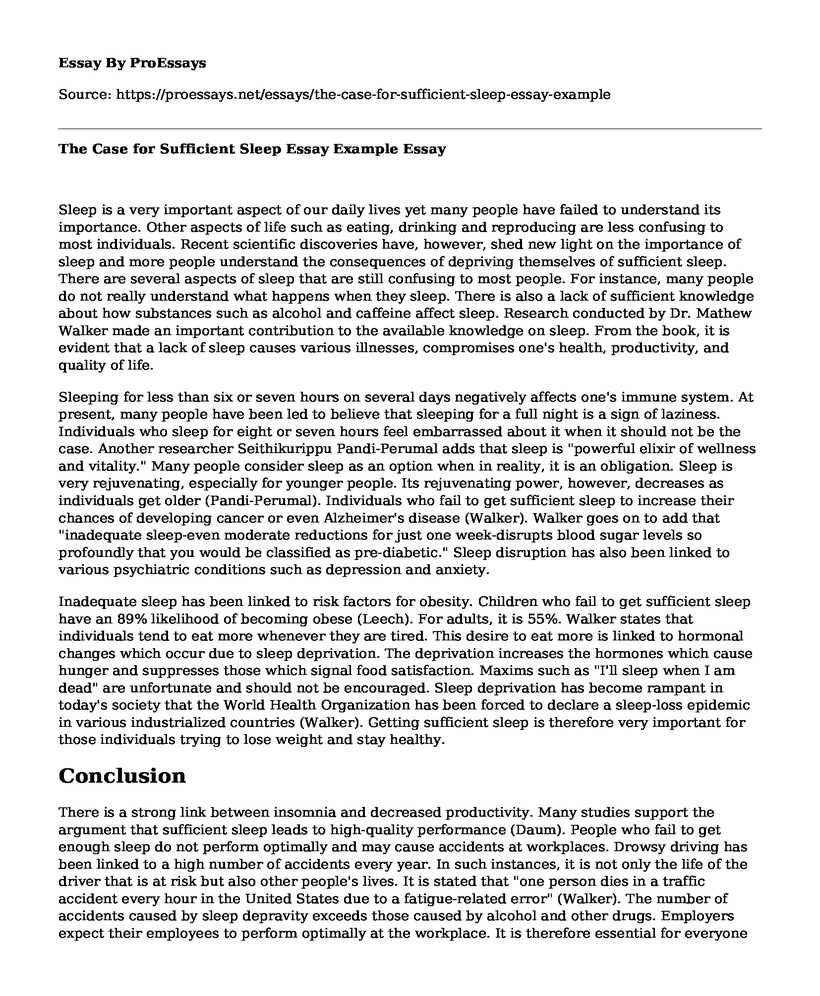Sleep is a very important aspect of our daily lives yet many people have failed to understand its importance. Other aspects of life such as eating, drinking and reproducing are less confusing to most individuals. Recent scientific discoveries have, however, shed new light on the importance of sleep and more people understand the consequences of depriving themselves of sufficient sleep. There are several aspects of sleep that are still confusing to most people. For instance, many people do not really understand what happens when they sleep. There is also a lack of sufficient knowledge about how substances such as alcohol and caffeine affect sleep. Research conducted by Dr. Mathew Walker made an important contribution to the available knowledge on sleep. From the book, it is evident that a lack of sleep causes various illnesses, compromises one's health, productivity, and quality of life.
Sleeping for less than six or seven hours on several days negatively affects one's immune system. At present, many people have been led to believe that sleeping for a full night is a sign of laziness. Individuals who sleep for eight or seven hours feel embarrassed about it when it should not be the case. Another researcher Seithikurippu Pandi-Perumal adds that sleep is "powerful elixir of wellness and vitality." Many people consider sleep as an option when in reality, it is an obligation. Sleep is very rejuvenating, especially for younger people. Its rejuvenating power, however, decreases as individuals get older (Pandi-Perumal). Individuals who fail to get sufficient sleep to increase their chances of developing cancer or even Alzheimer's disease (Walker). Walker goes on to add that "inadequate sleep-even moderate reductions for just one week-disrupts blood sugar levels so profoundly that you would be classified as pre-diabetic." Sleep disruption has also been linked to various psychiatric conditions such as depression and anxiety.
Inadequate sleep has been linked to risk factors for obesity. Children who fail to get sufficient sleep have an 89% likelihood of becoming obese (Leech). For adults, it is 55%. Walker states that individuals tend to eat more whenever they are tired. This desire to eat more is linked to hormonal changes which occur due to sleep deprivation. The deprivation increases the hormones which cause hunger and suppresses those which signal food satisfaction. Maxims such as "I'll sleep when I am dead" are unfortunate and should not be encouraged. Sleep deprivation has become rampant in today's society that the World Health Organization has been forced to declare a sleep-loss epidemic in various industrialized countries (Walker). Getting sufficient sleep is therefore very important for those individuals trying to lose weight and stay healthy.
Conclusion
There is a strong link between insomnia and decreased productivity. Many studies support the argument that sufficient sleep leads to high-quality performance (Daum). People who fail to get enough sleep do not perform optimally and may cause accidents at workplaces. Drowsy driving has been linked to a high number of accidents every year. In such instances, it is not only the life of the driver that is at risk but also other people's lives. It is stated that "one person dies in a traffic accident every hour in the United States due to a fatigue-related error" (Walker). The number of accidents caused by sleep depravity exceeds those caused by alcohol and other drugs. Employers expect their employees to perform optimally at the workplace. It is therefore essential for everyone to routinely get enough sleep.
Works Cited
Daum, Kevin. "Science Proves Why Good Sleep Is Critical to Your Success." Inc.com, 14 Apr. 2017, www.inc.com/kevin-daum/science-proves-why-good-sleep-is-critical-to-your-success.html. Accessed 28 Nov. 2018.
Leech, Joe. "10 Reasons Why Good Sleep Is Important." Healthline, 29 June 2018, www.healthline.com/nutrition/10-reasons-why-good-sleep-is-important. Accessed 28 Nov. 2018.
Pandi-Perumal, Seithikurippu R. "Why We Sleep: The New Science of Sleep and Dreams by Matthew Walker, Ph.D." Sleep and Vigilance, vol. 2, no. 1, 2018, pp. 93-94.
Walker, Mathew. Why We Sleep: Unlocking the Power of Sleep and Dreams. Simon & Schuster, 2017.
Cite this page
The Case for Sufficient Sleep Essay Example. (2022, Sep 07). Retrieved from https://proessays.net/essays/the-case-for-sufficient-sleep-essay-example
If you are the original author of this essay and no longer wish to have it published on the ProEssays website, please click below to request its removal:
- Essay on Nursing: Lifelong Learning
- Paper Example on Relationship Between Homelessness and Poor Health
- Essay Example on Assessing Abdomen: Abnormal Findings & Diagnostic Tests
- Essay Sample on Pharmaceutical Industry: Controversial and Lucrative
- Paper Example on MSN Family Nurse Practitioner: Delivering Family-Focused Care
- Essay Example on Saturated Fats & Cardiovascular Risk: Evidence & Discussion
- Lateral Violence in Nursing: Dealing With Negative Attitudes - Essay Sample







